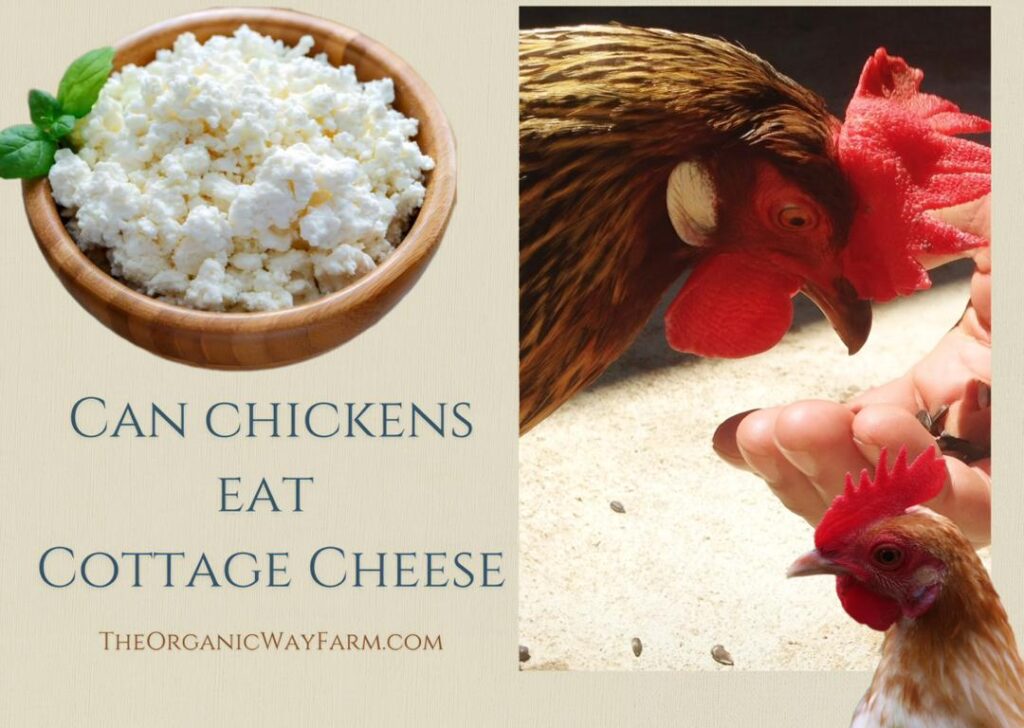Have you ever wondered what your chickens can eat? If you have some cottage cheese in your fridge and chickens in your backyard, you might be asking yourself, “Can chickens eat cottage cheese?” You’re definitely not alone! Many chicken owners want to make sure they are providing the best food for their feathered friends.
The good news is that YES, chickens can eat cottage cheese! It is a source of protein and can be a tasty treat for them. However, like with all foods we offer our chickens, we should ensure it is fed in moderation and is safe for their dietary needs. Now, let’s explore this topic further and uncover some valuable information you might not know.
Continue reading to find out the right way to feed cottage cheese to your chickens, how much they can eat, and the benefits and risks that come along with it. We have a lot to cover, and you might find some surprising facts! Below is what we will look at:
- Can Chickens Eat Cottage Cheese?
- How Much Cottage Cheese Can Chickens Eat?
- Best Way to Feed Cottage Cheese to Chickens
- Benefits of Feeding Cottage Cheese to Chickens
- Risks of Feeding Too Much Cottage Cheese to Chickens
- Substitutes for Cottage Cheese for Chickens
- Frequently Asked Questions about Cottage Cheese for Chickens
Let’s dive in!
Can Chickens Eat Cottage Cheese?

Cottage cheese is a soft cheese made from the curds of milk and has a mild flavor. It contains protein, calcium, and other nutrients that can be beneficial to chickens. Yes, chickens can eat cottage cheese, and many of them enjoy its creamy texture! It can serve as an occasional treat, but remember, treats should not take up more than 10 percent of a chicken’s diet.
Feeding cottage cheese to our chickens can provide them with some added protein, especially when they are laying eggs or recovering from illness. Protein is vital for the growth and upkeep of our birds, so adding a bit of cottage cheese can contribute positively to their overall diet.
How Much Cottage Cheese Can Chickens Eat?
When it comes to feeding cottage cheese to our chickens, moderation is key. Chickens are omnivores and have flexible diets, but cottage cheese should be given in small amounts. A few tablespoons per chicken, a few times a week, would be appropriate. Too much can lead to digestive issues since chickens have specific dietary requirements.
We want to ensure our chickens are getting a balanced diet that includes grains, seeds, vegetables, and protein sources. Cottage cheese can complement their diet but should not replace their main feed. Observing our chickens after feeding them cottage cheese is a good practice. If you notice any unusual behavior or digestive problems, it would be wise to reduce the amount.
As with any food, we need to ensure it’s fresh. Always check the expiration date and quality of the cottage cheese before serving it to our feathered friends. Providing healthy snacks is a fun way to bond with them!
Best Way to Feed Cottage Cheese to Chickens
The best way to introduce cottage cheese to our chickens is to mix it with their regular feed. You might want to start by only adding a little cottage cheese to their grain. This way, they will become accustomed to the taste without being overwhelmed. We can also try feeding it as a standalone treat during their free-ranging time.
Another option is to mix the cottage cheese with fruits or vegetables. For example, blending cottage cheese with mashed bananas or mixing it with some chopped vegetables can create a delicious and nutritious treat! Chickens are curious creatures, and combining flavors will encourage them to enjoy their food.
While feeding cottage cheese, it’s advisable to do it in the morning or early afternoon when the chickens are most active. Offering treats earlier allows them to have time to digest the food during the day. Keeping their living area clean after meals is another critical factor. Any leftover food should be cleaned up to avoid attracting pests.
Experimenting with different ways of serving cottage cheese will keep feeding fun and engaging. Who knows, they might end up enjoying it more than we expected!
Benefits of Feeding Cottage Cheese to Chickens
Hydration
Cottage cheese has a high water content, which can contribute to our chickens’ hydration. Keeping chickens well-hydrated is essential, especially during hot weather. A hydrated chicken is a healthy chicken! By incorporating cottage cheese, we can help in providing an additional source of moisture, alongside always providing fresh water.
Fiber
Cottage cheese offers dietary fiber that aids digestion in chickens. A well-functioning digestive system is crucial for our birds’ overall health. Including cottage cheese in moderation may help maintain a healthy gut, leading to better absorption of nutrients from their diet.
Vitamins and Minerals
Cottage cheese is rich in essential vitamins and minerals. Nutrients like calcium and phosphorus are important for chickens, especially hens that are laying eggs. Calcium contributes to strong eggshells, while phosphorus is crucial for energy transfer in the body. Providing a boost of these nutrients through cottage cheese can be quite beneficial.
Mental Stimulation
Feeding our chickens cottage cheese in fun ways can provide mental stimulation. Chickens enjoy pecking and foraging. Incorporating cottage cheese into their diet can encourage natural behaviors and keep them entertained. Offering different food textures and tastes can enrich their environment.
Nutritional Breakdown of Cottage Cheese
Understanding the nutritional breakdown of cottage cheese is vital. The protein content in cottage cheese is significant and can help support growth and feather development in chicks. It can also aid in repairing any damaged tissues in adult chickens. This makes it a nutritious option, especially for young birds or those recovering from illness.
Risks and Dangers of Feeding Cottage Cheese to Chickens
While cottage cheese has many benefits, we must also consider the potential risks. Feeding too much cottage cheese can lead to digestive disturbances. Chickens have delicate digestive systems, and excessive protein can create imbalances. Observing how our chickens react to new foods is important for ensuring their health.
Another risk is lactose intolerance. While some chickens can handle dairy, not all can tolerate it well. If we see signs of diarrhea, lethargy, or other unusual behaviors, it may indicate that cottage cheese does not sit well with them. Keeping a close watch on our chickens after introducing new foods can help identify these issues early.
Using high-quality cottage cheese is essential. Cheap or expired products may contain harmful bacteria or mold. This can lead to food poisoning, and we certainly want to avoid that! Always serve fresh and check for any signs of spoilage.
Just like we wouldn’t overfeed our kids candy, we want to apply the same logic to our chickens and treats. They should enjoy cottage cheese occasionally. Maintaining a balanced diet is key to their happiness and health.
Substitutes for Cottage Cheese for Chickens
If we want to look for substitutes for cottage cheese, yogurt can be a great alternative. It’s creamy and packed with probiotics, which can help our chickens’ gut health. Just like cottage cheese, yogurt should be offered in moderation. We can find plain yogurt to avoid added sugars that aren’t suitable for chickens.
Another substitute can be scrambled eggs. Eggs are a fantastic source of protein, too! If we have some backyard hens, using their eggs can provide a wholesome treat. Boiled eggs mashed as a treat are delicious and can be a fun way to offer protein without any risks associated with dairy.
Fruits like bananas or berries can also serve as nutritious snacks. They bring natural sugars and vitamins to the table, but again, these should be limited in the diet. Providing variety keeps our chickens eager and excited for mealtime!
Can Chickens Eat Cottage Cheese? Frequently Asked Questions
Is cottage cheese safe for chickens to eat daily?
While cottage cheese is nutritious, it’s best not to feed it daily. It should be an occasional treat to maintain a balanced diet.
What is the best type of cottage cheese for chickens?
Plain, low-fat cottage cheese is usually the best option. Avoid any flavored varieties that may contain additives and sugars.
How do I know if my chickens like cottage cheese?
Try offering a small amount and observe their reactions. If they eagerly peck at it, they likely enjoy it!
Can I mix cottage cheese with other foods?
Absolutely! Mixing cottage cheese with grains, fruits, or veggies can make a delightful meal for our chickens.
What should I do if my chickens show signs of distress after eating cottage cheese?
If we notice signs of distress such as diarrhea or lethargy, it’s best to stop feeding them cottage cheese and consult a veterinarian.
Final Thoughts
Chickens can indeed enjoy cottage cheese, and it can provide several benefits as long as we feed it in moderation. Evaluating how our chickens respond to different foods is important. By being attentive and ensuring they have nutritious and safe options, we are contributing to their overall health.
If you want to learn more about what other delicious treats you can offer your flock, you might be interested in exploring this link about chickens eating grapes to expand their diet. Remember that happy and healthy chickens make for wonderful companions, providing us with eggs and joy every day!






